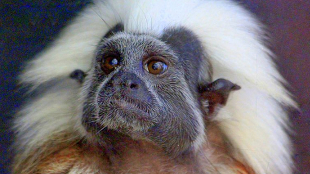 A cotton-top tamarinWIKIMEDIA, CUATROCK77Harvard Medical School this week announced that it will shut down its primate research center over the next 2 years, reported ScienceInsider. The school cited the “increasingly challenging” federal funding environment as the reason behind decision, with no mention of the recent investigations into the center’s animal welfare practices.
A cotton-top tamarinWIKIMEDIA, CUATROCK77Harvard Medical School this week announced that it will shut down its primate research center over the next 2 years, reported ScienceInsider. The school cited the “increasingly challenging” federal funding environment as the reason behind decision, with no mention of the recent investigations into the center’s animal welfare practices.
Harvard said it would wind down operations at the New England Primate (NEPRC) Research Center in Southborough, Massachusetts, by 2015 rather than seek to renew the center’s 5-year grant from the National Institutes of Health (NIH). The center’s roughly 2,000 monkeys—mostly rhesus macaques and cotton-top tamarins—will be transferred to the NIH’s seven other national primate centers, and Harvard said none of the animals will be euthanized.
“We are in the early stages and focusing our attention on working with our faculty, staff, and the NIH in order to assure a transition that is orderly and respectful to all concerned, including the animals,” Gina Vild, a spokeswoman for the medical school, told The New York Times. The center currently employs 20 faculty members, 32 postdocs and ...













